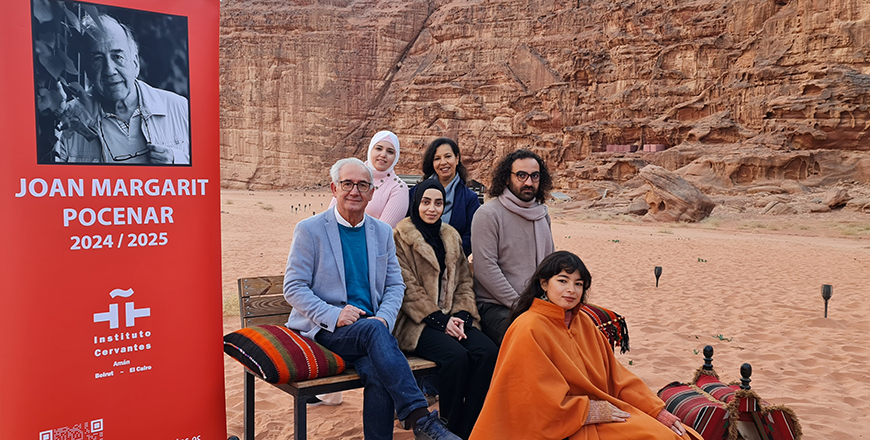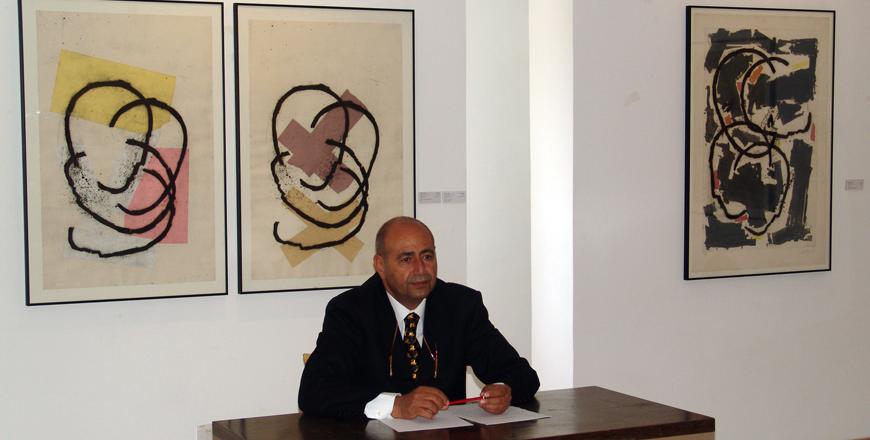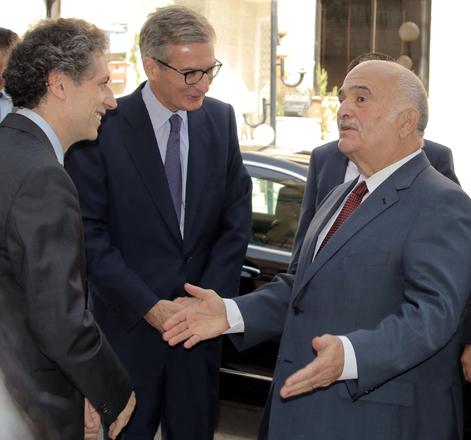You are here
Joan Margarit translated into Arabic in the Wadi Rum desert
By JT - Dec 11,2024 - Last updated at Dec 11,2024

From right to left: (back): Anwaar Abdel Fadeil and Wedad Bassam Ilhusseini. (Centre): Mohamad Bitari, Mai Tariq Yousif Alwaraydat, and José Luis Morante. (Front): Yasmin Tarek Abuzaid El Sayed. (Photo courtesy of Instituto Cervantes)
AMMAN — The centrse of Instituto Cervantes in Amman, Beirut, and Cairo have recently held the first workshop of the Translation Programme Poetas Cervantes en Árabe (POCENAR) in the Wadi Rum Desert, with Catalan writer Joan Margarit as protagonist.
The programme, due to take place during the 2024/2025 academic year in Jordan, is supported by the Embassy of Spain in Jordan, the Abertis Foundation and Beirut Digital District, according to a statement for The Jordan Times.
Margarit, who writes his poems in both Spanish and Catalan, Spain's co-official languages, won the 2019 Cervantes Prize in Literature, which is considered the highest recognition of Spanish literature.
POCENAR aims to promote the work of the mentioned poets in the Arab world and to give visibility to the work of translators, especially the young ones, by contributing to their training, thus positively impacting in the quality of poetry translated into Arabic, the statement said.
The poet and architect Joan Margarit (Sanaüja, Spain, 1938-2021) was a professor of Architecture and participated in the construction of the Sagrada Familia. He wrote his poems in both Catalan and Spanish and received the Cervantes Prize in 2019.
Four young translators from Jordan and Egypt, selected through a recent competition, participated in this first in-person workshop, led by poet and critic José Luis Morante and translator and writer Mohamad Bitari, professor of Arabic at the Autonomous University of Barcelona.
POCENAR was born in Marrakech in 2016, and continued in Lebanon as of 2019. It has published bilingual poetic anthologies of Chilean Gonzalo Rojas, Spaniards José Hierro and María Zambrano, Uruguayan Ida Vitale, Mexican José Emilio Pacheco, and Colombian Álvaro Mutis.
Coinciding with the workshop, the Instituto Cervantes in Amman and the Embassy of Venezuela in Jordan inaugurated the photography exhibition "Transhumance" by Venezuelan photographer Héctor Varela. The exhibition was displayed at the Rum Art Centre in the village of Wadi Rum. The activity connected between the shepherding practices in the Spanish-speaking countries and the nomadic Bedouins tradition in this area, thus opening bridges between both cultures.
The next translation workshop will be held in May 2025 in Jordan, and will feature, in addition to the afore mentioned Mohamad Bitari, Lebanese Noura Sayed Rodríguez, Moroccan Hassan Boutaka, Egyptian Ali Abdel Latif, Jordanian Adnan Kadhim, and Syrian translator Jaafar Aluni as professors.
Related Articles
AMMAN — The works of master Spanish artists — from Francisco Goya to Pablo Picasso — will be available for the perusal of the Jordanian publ
AMMAN — Spanish flamenco singer extraordinaire Curro Piñana is scheduled to perform in Amman on Tuesday, presenting different styles of flam
AMMAN — More than ever, the world needs to introduce spiritual elegance and beauty to all aspects of human culture, HRH Prince Hassan said o














